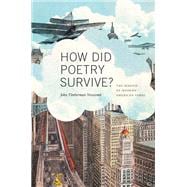
Note: Supplemental materials are not guaranteed with Rental or Used book purchases.
Purchase Benefits
What is included with this book?
| Acknowledgments | p. ix |
| Introduction: A Modernism of the City | p. 1 |
| Inventing the New Verse | |
| American Poetry on the Brink, 1905-12 | p. 9 |
| Poetry's Opening Door: Harriet Monroe and American Modernism | p. 26 |
| Young, Blithe, and Whimsical: The Avant-Gardism of The Masses | p. 54 |
| There is Always Others: Experimental Verse and "Ulterior Social Result" | p. 79 |
| Volunteers of America, 1917: The Seven Arts and the Great War | p. 118 |
| Keys to the City | |
| Gutter and Skyline: The New Verse and the Metropolitan Cityscape | p. 147 |
| Footprints of the Twentieth Century: American Skyscrapers, Modern Poems | p. 180 |
| Subway Fare: Toward a Poetics of Rapid Transit | p. 217 |
| Notes | p. 263 |
| Bibliography | p. 303 |
| Index | p. 327 |
| Table of Contents provided by Ingram. All Rights Reserved. |
The New copy of this book will include any supplemental materials advertised. Please check the title of the book to determine if it should include any access cards, study guides, lab manuals, CDs, etc.
The Used, Rental and eBook copies of this book are not guaranteed to include any supplemental materials. Typically, only the book itself is included. This is true even if the title states it includes any access cards, study guides, lab manuals, CDs, etc.